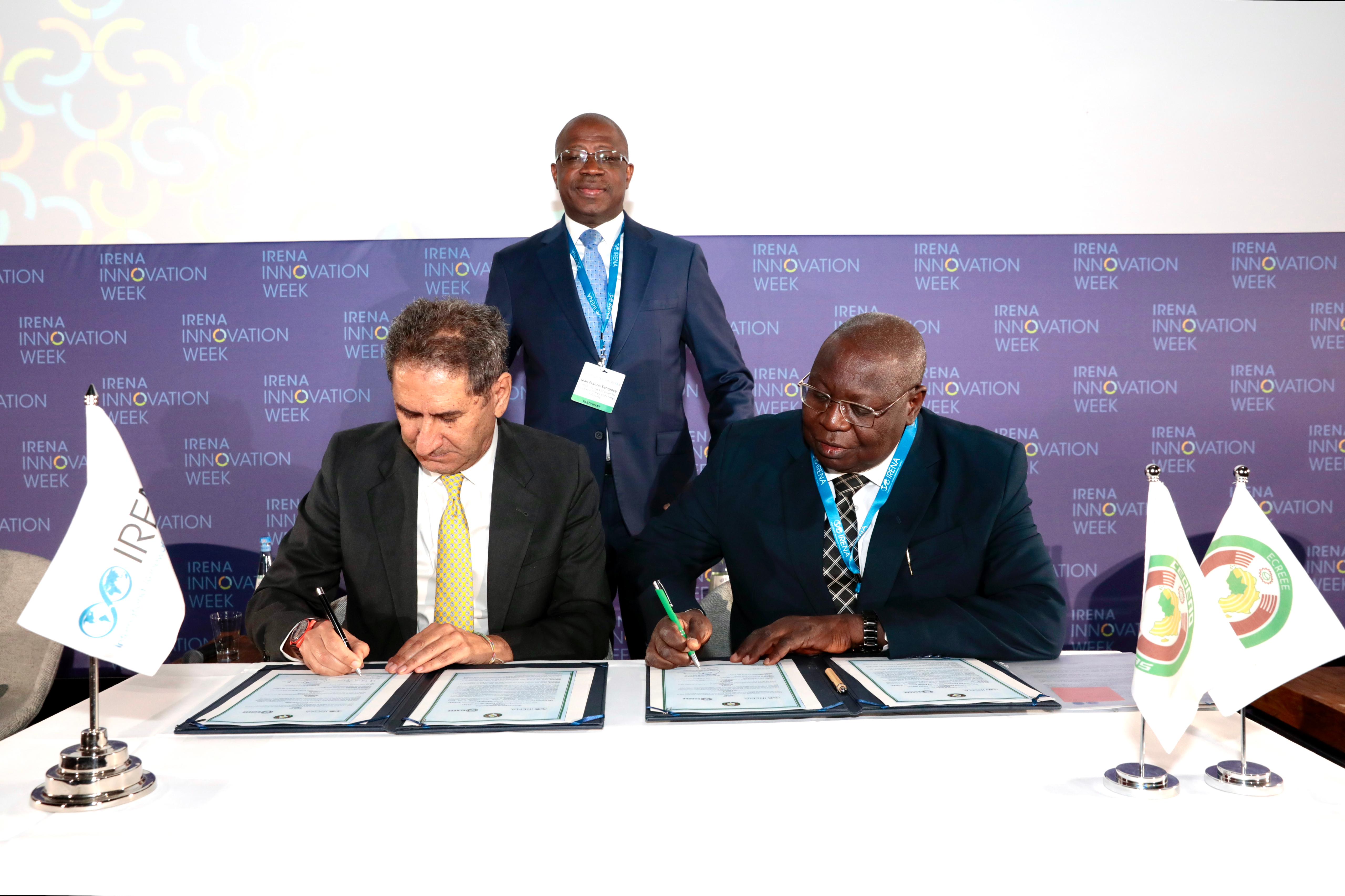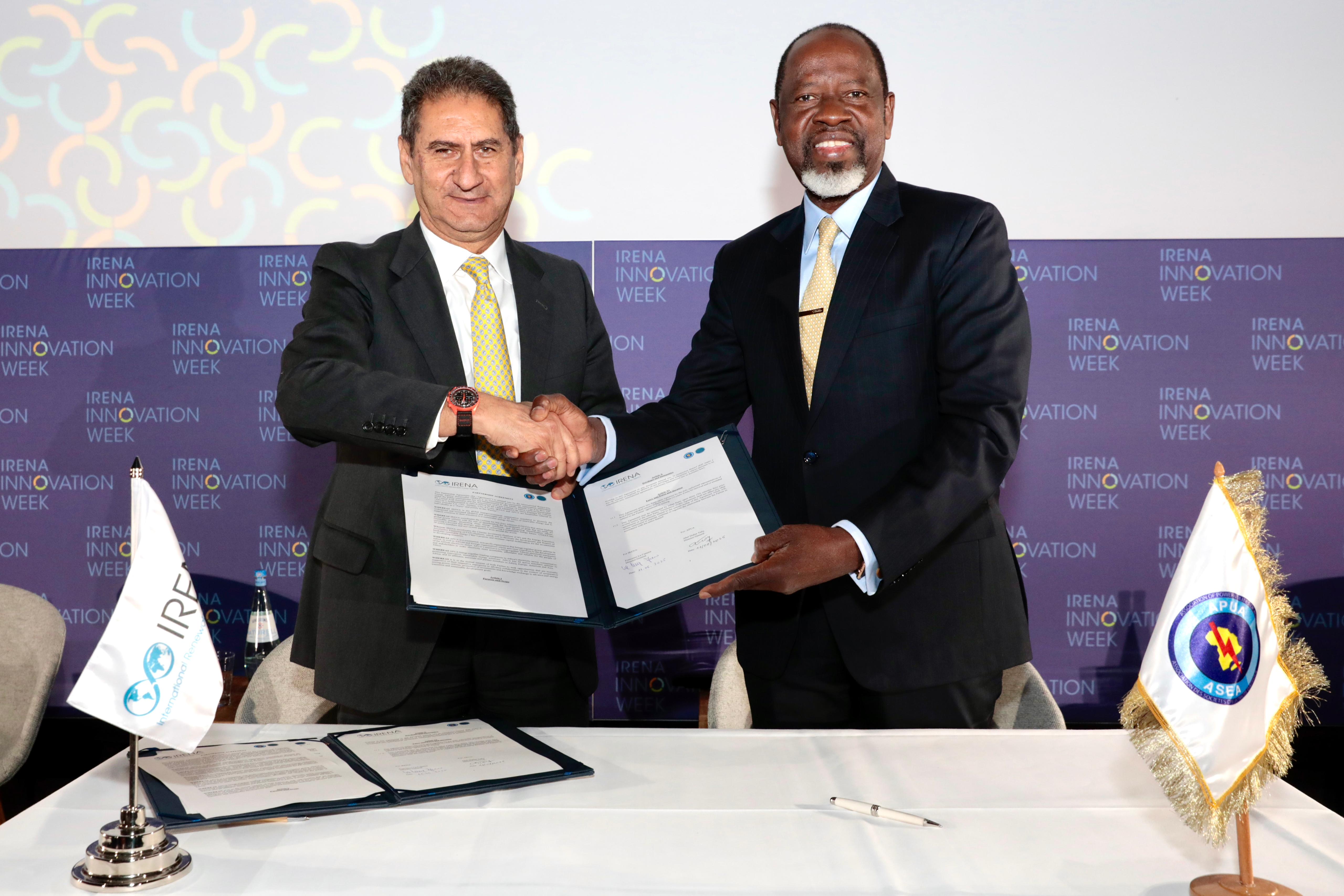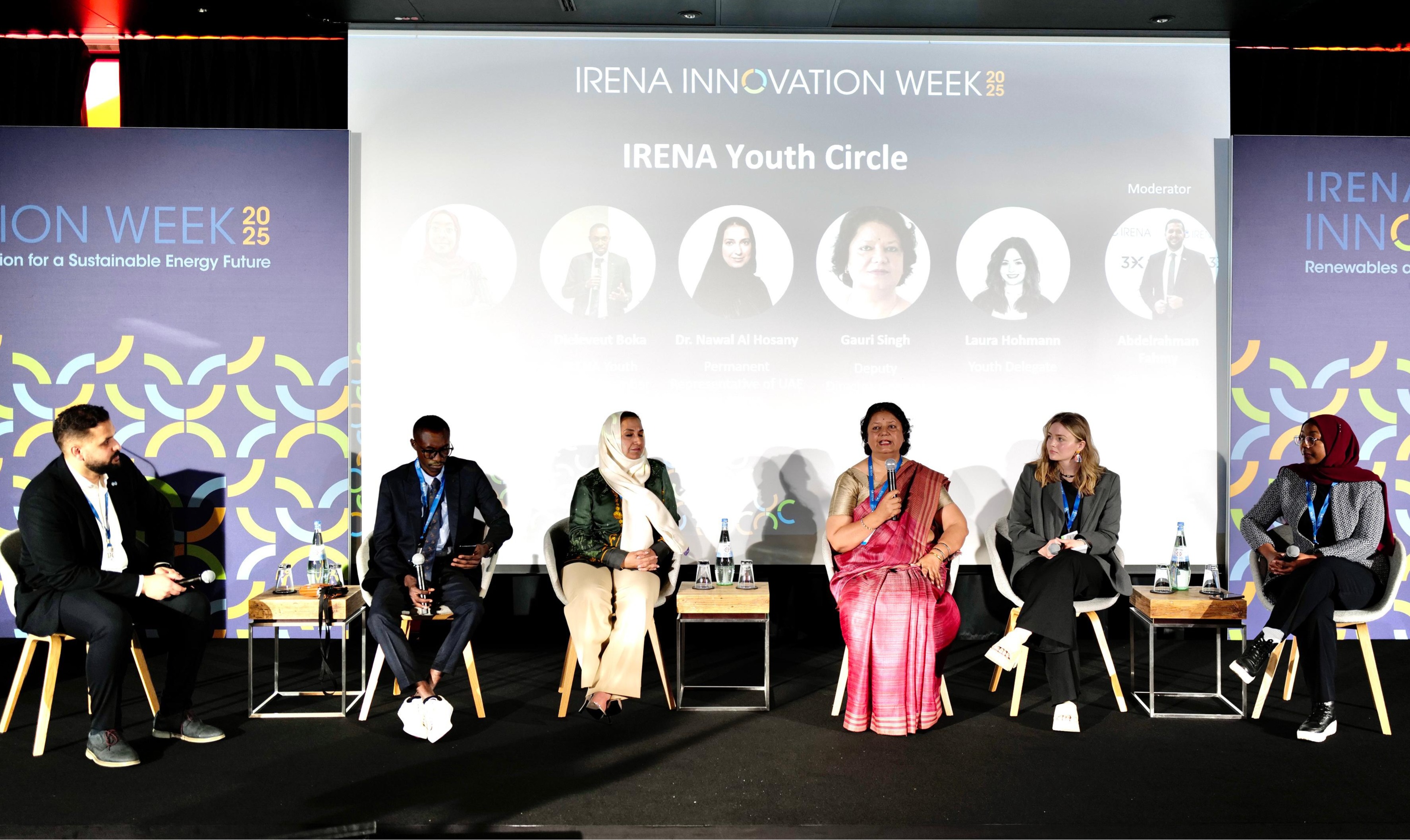Innovation Week 2025: Background
IRENA Innovation Week brings leaders, experts, industry representatives, academia, youth and policymakers together to explore cutting-edge innovations that can drive the global energy transition and advance sustainable development, enabled by renewable energy and digitalisation technologies.
The fifth edition of Innovation Week, taking place in Bonn, Germany, builds upon previous successful gatherings, each focusing on different aspects of the renewable energy transition. This evolution has progressed from the 2016 and 2018 editions that focused on innovations to decarbonise power systems and integrate high shares of renewables, through the 2020 and 2023 editions that explored innovation solutions for decarbonising end-use sectors.
The 2025 edition focuses on two aspects: Innovation in infrastructure for tripling renewables and Renewable-based solutions for sustainable development.
The discussions this week will highlight and explore pioneering renewable and digitalisation-driven innovations, address critical infrastructure gaps, resilient power systems, and productive energy use, while fostering collaboration among a dynamic global network of stakeholders from IRENA’s 170 member countries.
Stay tuned for more updates and see the event programme here.
High level dialogue: Innovation catalysing the tripling of renewables for sustainable growth
Under the COP28 Tripling Renewables Pledge, governments have committed to triple global renewable energy capacity to at least 11,000 GW by 2030, representing a critical pathway to limiting global warming to 1.5°C.
Against this backdrop, the high-level opening session brings together representatives from the public and private sector, international organisations and other stakeholders to discuss how the latest innovations in infrastructure, market mechanisms, and digital technologies can accelerate progress toward the tripling target. A focus will be placed on how these innovations can facilitate the decarbonisation of energy systems with renewable-based solutions that ensure reliability and affordability.
This session sets the stage for IRENA’s Innovation Week 2025 by integrating insights from two pivotal aspects: infrastructure innovations for tripling renewables through digitalisation, and renewable-based solutions that advance sustainable development.
Norela Constantinescu, Acting Director, IRENA Innovation and Technology Centre (IITC), welcomed all attendees saying, “All the regions should have energy systems that are secure and affordable, renewables are the cheapest form of electricity. Looking ahead, all countries should take the advantage of innovations to gain access to electricity and develop their economic potential.”
 Francesco La Camera, the IRENA Director-General delivered the opening speech, saying, “This year’s theme, Renewables and Digitalisation for a Sustainable Energy Future, is not only timely, it is essential”. Innovation is no longer optional, it is indispensable, helping to create new opportunities for all, he continued. Focusing on the theme of this fifth edition, he underlined that, “The scale and urgency of energy transition demands new thinking, new tools and new partnerships. Successful innovation is shaped by context and grounded in local realities, but is driven by a shared ambition.” |
 Michael Hackethal, Head of Division, Federal Ministry of Economic Affairs and Energy, Germany, delivered a keynote speech emphasising the technological advancements’ which have transformative potential in driving energy transition. He said, “The theme of this year’s Innovation Week captures the huge potential of technological advancements for energy transition, which we need together with policies. An efficient energy system is key to meet our decarbonisation targets, reach net zero, and ensure energy security.” He highlighted countries’ strategic focus on strengthening energy independence, noting, “Our markets need to remain open for investment. All nations are collaborating but also pursuing technological leadership. This dynamic is complex but can accelerate the energy transition.” Addressing the scale of change required, he emphasised, “Infrastructure requirements that come with energy transition are substantial and urgent. Successful innovation requires forward-looking policy, financing and robust sharing networks.” He concluded, “We can build an affordable and secure energy future through innovation.”
|
 Dr. Nawal Al-Hosany, the Permanent Representative of the UAE to IRENA, delivered her keynote speech emphasising the urgency of climate action. She said, “Climate change is no longer a distant threat; it is a lived reality. And yet, within this challenge lies unprecedented opportunity. Innovation is not just desirable – it is essential. It is our compass, our catalyst, and our most powerful tool in shaping a world powered by clean energy.” She further encouraged all event attendees to take action and focus on impacts, saying, “We must innovate faster, act smarter and include everyone”. Addressing the evolution of energy transition challenges, she noted, “The energy transition is no longer limited by our ability to generate clean power – but by how swiftly, reliably, and equitably we can deliver it to where it’s needed most. This is a moment for bold leadership, for visionary partnerships, and for integrated systems that are not only smart, but just.” |
In his keynote speech, Dr. Li Sheng,Director-General, China Renewable Energy Engineering Institute (CREEI), provided an overview of China’s remarkable progress on the energy transition. He underlined that the growth of renewables in China contributed substantially to the global energy transition and provided three key benefits to local communities: more jobs, better lives and poverty eradication. He also praised IRENA as the world’s leading international organisation that plays a vital role in fostering global cooperation towards our shared energy goals, encouraging further dialogue and knowledge exchange. He concluded saying, “Together, let’s turn the shared the vision into tangible action through innovation and build not only a cleaner but sustainable world.”
Yohannes Bimrew, IRENA Youth Delegate and CEO of HuluSolar, shared his personal experiences with the introduction of renewable energy to his community to address energy access issues, and how it inspired him to pursue a career in renewables.
The High-level dialogue on Innovation catalyzing the tripling of renewables for sustainable growth, moderated by Ms. Gauri Singh, Deputy Director, IRENA, is ongoing. Explaining why innovation in renewable energy is essential for the energy transition, she remarked, “Every time you think you have a solution, a new challenge appear,” setting the scene for the panel discussion.
.jpg)
The opening session of the 2025 IRENA Innovation Week focused on accelerating renewable energy through innovation and digitalisation as key drivers for a sustainable energy future. Digitalisation, including the use of artificial intelligence (AI), is crucial for integrating renewables into power systems and end-use sectors, enhancing grid resilience and enabling smarter management. Speakers emphasised that innovation must be context-specific, involving upgrading infrastructure in industrialised countries and focusing on expanding energy access and building resilient systems in developing regions.
During the panel discussion, speakers highlighted that innovation must be systemic, encompassing not just technology but also policy, finance, and knowledge-sharing networks. Yoshiomi Yoshino, Director, Ministry of Economy, Trade and Industry, Japan, Sédiko Douka, Commissioner for Infrastructure, Energy and Digitalisation, ECOWAS and Stephane Cools, President, Walloon Air and Climate Agency (AwAC), Belgium shared their experiences with innovations for the energy transition, showing that innovation is not a luxury but essential to achieving energy transition goals at the required scale and speed. The speakers reinforced that the energy transition is unstoppable but requires continuously innovative approaches to address the evolving reality.
Overall, the discussion reinforced that the energy transition is unstoppable and requires not just technological advancements but also innovation in policy, business models, financing mechanisms, and strong international collaboration and knowledge sharing networks to overcome substantial infrastructure requirements.

On the sidelines of the Innovation Week today, IRENA signed an Memorandum of understanding (MoU) agreement with ECOWAS Centre for Renewable Energy and Energy Efficiency (ECREEE) to strengthen cooperation and promote the development of renewable energy and improve access to modern energy resources.

A second Partnership Agreement between the Association of Power Utilities of Africa (APUA) and IRENA was signed to advance collaboration on cooperation among power utilities, promotion of investments and knowledge exchange to accelerate just energy transition and sustainable development goals.
IRENA NewGen Hackathons for Youth – Launching Event

The IRENA NewGen Hackathons for Youth launched today at the sidelines of the IRENA Innovation Week. IRENA will engage regional youth organisations, Utilities for Net Zero Alliance (UNEZA), Alliance for Industry Decarbonisation (AFID) and Coalition for Action as partners in the implementation of the upcoming hackathons.
The event featured a Youth Cycle discussion between the youth delegates and IRENA Deputy Director-General Gauri Singh and Permanent Representative of the UAE to IRENA Dr. Nawal Al-Hosany.
Dr Nawal Al Hosany shared her thoughts on what is needed to make the cooperation with Youth a success. “Renewables is a cornerstone of climate action”, she said. She continued outlining how crucial it is to find solutions that meet both, ours and the planet’s needs. Innovation provides an opportunity to do that.
Source link
www.irena.org




